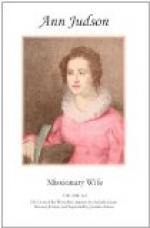The seventh year of her marriage with Mr. Judson, was a year of peculiar trial to Mrs. J. All her four children were attacked by whooping-cough followed by one of the diseases of the climate, with which she also was so violently afflicted that her life was for a time despaired of. She felt sure, as she afterwards said, that her hour of release was come, that her master was calling her; and she blessed God that she was entirely willing to leave all, and go to him. The only hope of recovery for any of them was a sea-voyage, and they embarked for Bengal, but their passage was stormy, and they derived little benefit from their stay at Serampore, where they had taken up their residence. A voyage to the Mauritius was recommended, and the alarming situation of three of the children, as well as Mrs. Judson’s feeble state, determined them to try it. But before they embarked, it was her melancholy lot to lay one of her darlings in the grave, and he, the very one about whose health she had felt the least uneasiness. He sleeps, says his mother, in the mission burial-ground, where moulders the dust of Carey, Marshman and Ward. Her tears at his burial flowed not only for him that was dead, but for another who she expected would soon follow him. To avert this calamity she hastened her voyage, which though fearfully tempestuous, proved beneficial to the sufferers, and after a short sojourn in the soft climate of the Isle of France, the family returned to their home in Maulmain, restored, with the exception of one son, to sound health. This son, who bore the name of his father, was called by the natives Pwen, which signifies “a flower,” a name adopted by his parents. After a long illness he too was restored to health.
Mrs. Judson’s labors during the latter part of her life, are recorded by her husband; and it may well excite the wonder of those women who consider the care of their own families a sufficient task, that she could find time and strength for such an amount of labor. It has been said that her translation of Bunyan’s Pilgrim’s Progress is a work worth living for. Her husband says, “It is one of the best pieces of composition we have published.” She also translated a tract written by her husband; edited a “Chapel hymn book,” and furnished for it twenty of its best hymns; and published four volumes of Scripture Questions for use in the Sabbath Schools. When we consider that she was the mother of a rapidly increasing family; and the head of an establishment, which like all in the East require constant and vigilant superintendence; and that she was exemplary in the discharge of her maternal and domestic duties, we are led to fancy she must have possessed some secret charm by which she could stay the hurrying feet of time; and “hold the fleet angel fast until he blessed her.” Such a secret was her untiring zeal, which prompted an incessant industry. The sands of time are indeed numerous, and when each is valued as a sparkling treasure, they




